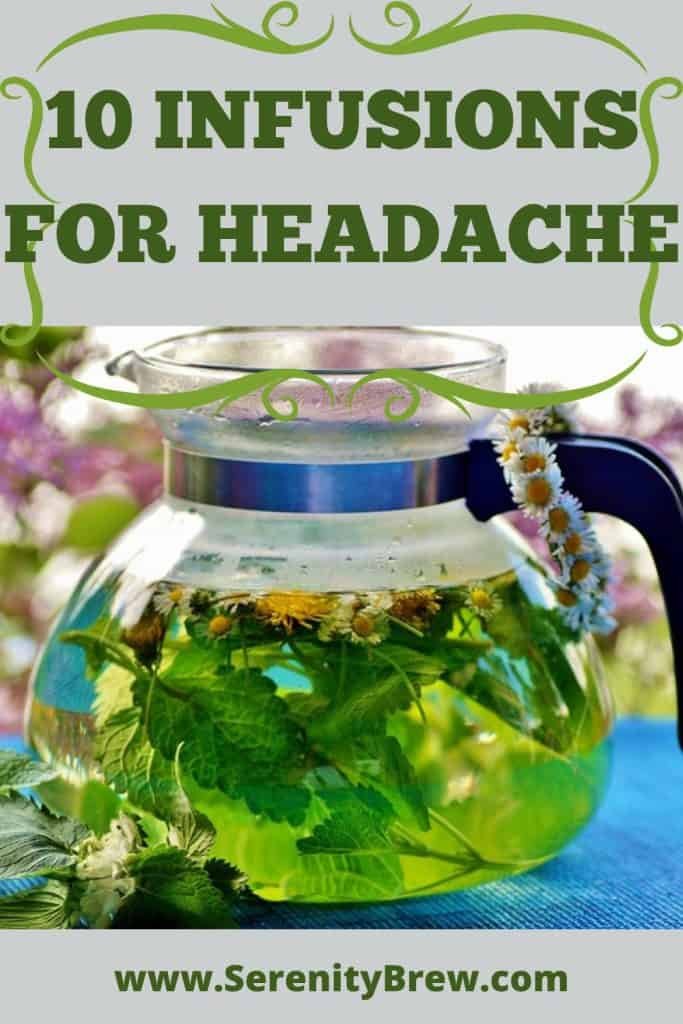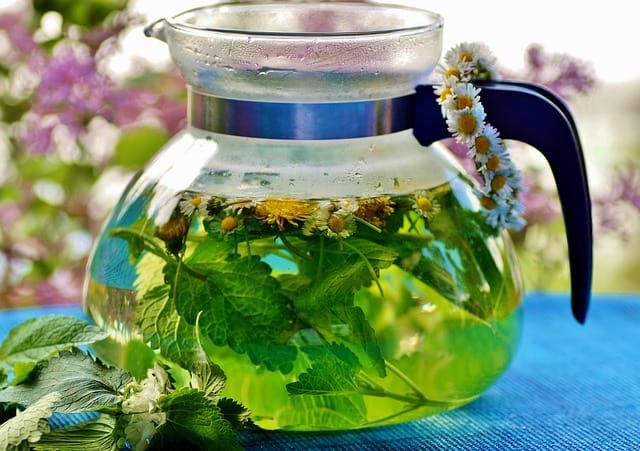
It seems not, but when it comes to taking an infusion, our attitude and the environment around us are very important to fight against headaches. You should be in a quiet place and take it easy.
Who has not had a headache at some time in their life? This symptom usually appears in situations of stress, anxiety or fatigue. Because the muscles of the neck and scalp become tense. In these cases, pain relievers can be used, but it is much more advisable to take natural remedies and infusions to relieve the headache.
Personal problems, stress from work or the simple fact of having your head in the same position for a long time can cause this malaise.
Another factor to take into account and that can cause a headache is the temperature of the place where you are. This discomfort is characterized by dizziness, dry mouth, exhaustion and pressure in the frontal area of the head.
These are some infusions that will help you fight the headache. Although if after trying the infusions, you still feel this discomfort, see a doctor, since the headache can sometimes trigger diseases.
How to treat headache?

Infusion of chamomile, rosemary and basil
It is a mixture of various plants that contain calming and analgesic effects, it is perfect and suitable for cases of headaches.
This infusion for headache should be taken twice a day, once as soon as you get up, on an empty stomach, and another in the afternoon. As the headache may be prolonged, this infusion should be taken for approximately a week. If these steps are followed correctly, the effects of the headache will diminish.
Its method of use consists of putting a rosemary branch, three chamomile flowers and two more basil branches in boiling water, and letting it rest for a few minutes before drinking the infusion. It is advisable to add a little honey to give it a sweet touch.
Chamomile sachets can also be used as an alternative to chamomile flowers. You can find them in any herbalist or supermarket.
Infusion of mint and jasmine
The combination of these two plants is super healthy and delicious. Contains sedative and calming properties, which help alleviate headaches.
Its properties are very popular and widely used for relaxing muscles and the nervous system. It should be taken a couple of times a day, one as soon as you get up, on an empty stomach, and another in the afternoon.
Its method of use consists of putting three mint leaves or a bag of mint, which is easy to find in any herbalist. Jasmine can also be found there. These plants are then placed in boiling water and allowed to rest for about five minutes. And it would be ready to drink.
Eggplant infusion
It may surprise you that there is an aubergine infusion, but it is very effective for hydrating the body and promotes circulation and helps with tension.
The effects will begin to be noticed after 5 days. It should be taken cold and after breakfast.
Its method of use consists of putting a sliced aubergine in ½ liter of boiling water and letting it heat for approximately half an hour, so that all the nutrients are released. Then it should be left to rest for 15 minutes and later filter the water. When you have finished doing all this, you have to put the infusion in the fridge for half an hour, and it would be ready to drink. You can add a tablespoon of honey to sweeten it a bit. This infusion can be taken 3 times a day in case the headache is very strong on a specific day.
Black tea
Among the teas with theine is black tea, and that is why it is one of the best infusions for headaches. According to studies by the American Migraine Association, the consumption of this tea can help alleviate headaches. Although moderate consumption should be taken, since excess theine is not good either and could further increase the frequency of headaches.
Green Tea
This contains is rich in anti-inflammatory properties called catechins. It also contains theine, but in less quantity than black tea. Thanks to these two substances, it helps fight headaches.
Rooibos Infusion
It is known as Rooibos tea, but it is not really a tea, since it does not come from the tea plant (Camelia Sinesis), but rather a tisane. As it does not contain caffeine, it is highly recommended for those people who do not tolerate this substance.
This “tea” contains flavonoids, specifically aspalatin and notofagin, which are antioxidant substances. Antioxidants help fight oxidative stress, and protect the body from disease. Precisely, some inflammatory processes are caused by oxidative stress. Being rich in antioxidants and being anti-inflammatory, it is highly recommended to alleviate headaches.
Mint tea
This infusion is perfect to drink right after a meal, as it has digestive properties. But, in addition, it also has anti-inflammatory properties, which is why it often appears in pain ointments, which are made from mint among other substances.
This infusion is highly recommended to ingest it to treat pain ranging from migraines to muscle pain.
Ginger tea
Ayurvedic medicine usually recommends the consumption of ginger for inflammatory processes (since it is a famous natural analgesic) such as after physical exercise. This infusion for headaches is rich in a substance called gingerol, which has an anti-inflammatory effect and helps reduce headaches and migraines.
There are studies that indicate that there is a drug called sumatripan, which is used to treat migraine, and is as effective as ginger for treating it.
Its mode of use consists of adding a tablespoon of grated ginger in boiling water. Then, it should be allowed to rest for about 5 minutes.
Ginger is a somewhat spicy substance. If you find it excessively spicy, you can reduce the amount of ginger or you can add a little honey or lemon to give the infusion a sweet touch.
Chamomile infusion
Chamomile is an infusion that is highly recommended to treat anxiety and insomnia, thanks to its anxiolytic and relaxing effects. Although it has not been scientifically proven that it works to treat headaches, it can help alleviate the cause of pain in cases of tension headache.
For its preparation, you must add 2 tablespoons of dried flowers in a cup of boiling water, and let it rest for 5 minutes, so that all its properties are extracted.
lemon balm infusion
This infusion has been used for many years to treat the symptoms of anxiety and stress, as it contains relaxing, anxiolytic and calming properties. For this reason, lemon balm is a great option if you are suffering from anxiety or stress symptoms and want to fight against them.
Its method of use consists of letting two tablespoons of lemon balm leaves rest in boiling water for approximately 10 minutes, so that, in this way, all the properties it contains are extracted.
It is possible to find lemon balm in two formats, the plant or bags with lemon balm in supermarkets or any herbalist.
The way in which these infusions are taken is of great importance, since if it is taken in a relaxed and calm space, taking small sips, its results will be more successful and you will enjoy a better experience. Because it is not a medicine as such, but rather a natural remedy that must be taken in a relaxed manner.
It is highly recommended to take them sitting comfortably, after a hot and relaxing shower, without rushing.
We are delighted to share these infusions with you, and we hope that all this information will help you.
In any case, if these remedies do not work, and the headaches are persistent, it is advisable to see a doctor to see how to treat your particular case.
